The American Legion Post was packed as people listened to these United States heroes.
Photo: RICH SCHMITT
An Evening of Honor was held on November 18 to recognize five Medal of Honor recipients at the Ronald Reagan American Legion Post 283. Two men had received medals for their actions during the Vietnam War: Specialist 5 James C. McCloughan and Col. (Ret.) Jack Jacobs. Three had been recognized for fighting in Afghanistan and included: Lt. Col. William D. Swenson, Staff Sgt. Ryan Pitts and Master Sgt. Leroy Petry.
A special family interactive session was held earlier in the afternoon at the Post and families, parents and children were invited to speak to the servicemen and learn the six core values associated with the medal: courage, sacrifice, integrity, commitment, patriotism, and citizenship.
The evening program was specifically for adults and included cocktails and a light buffet dinner.
Emcee Bob Jerome hosted the panel discussion after dinner. “The highest military honor is the Medal of Honor,” he said and explained the medal was first presented during President Abraham Lincoln’s term (and then only for the Army). The honor has now been expanded to other areas of the military.
“There have been 3,517 people decorated with the medal,” Jerome said. “Only 65 are alive today.”
The first question he asked went to Lt. Colonel William Swenson and to Jack Jacobs, “Prior to walking into the ambush was there any military intelligence?” Jerome asked.
“Intelligence is inherently flawed,” Swenson said. “Intelligence is an oxymoron.” He said that they used “gut instinct” and the men felt that something was off before they walked into the ambush.
Jacobs agreed with him. “We walked into an enemy that had three days to prepare. I knew something was wrong, you knew something bad was going to happen.” Jacobs, has authored two books: If Not Now, When? Duty and Sacrifice in American’s Time of Need and Basic: Surviving Boot Camp and Basic Training, said that he found out 46 years later when he went back to Vietnam that the men had walked into an L-shaped trap.
Jacobs is regularly featured on the NBC Evening News and MSNBC as their expert on military affairs.
COLONEL WILLIAM SWENSON received his Medal from President Barak Obama in 2013. On his second tour in Afghanistan at the Battle of Ganjgal, he and part of his coalition force who were to meet village elders walked into a well-planned ambush. He and two comrades crossed 50 meters of open space under direct fire to administer First Aid to his severely wounded sergeant. Taliban demanded that he surrender and instead the threw a hand grenade, which helped rally his comrades. He helped evacuate his sergeant and then went through the “kill zone” at least two more times to help evacuate additional wounded. His actions are believed to have directly contributed to saving more than a dozen lives.
JACK JACOBS received his medal in 1969 from President Richard Nixon. In 1968, Jacobs was with a lead company in the South Vietnamese Battalion when without warning they came under intense fire by the Vietcong who were merely 50 yards away and the ground became a killing field with many of the battalion killed or wounded. Jack was hit by shrapnel from an enemy mortar round that tore through the top of his head. He was bleeding heavily with most of the bones in his face broken and having lost sight in one eye. In complete disregard of his wounds, Jack dragged his badly wounded American sergeant to safety and then returned to the killing zone to save others. He did this over two dozen times, each time through a hail of enemy fire. He kept at it until he finally collapsed from his wounds.
Jerome asked Pitts about being in the battle and “what were your thoughts?”
RYAN PITTS received his medal of honor from President Barak Obama in 2014. After being deployed in Afghanistan for 14 months, he was on his last mission when he and his team of paratroopers came under attack. He and six other paratroopers were either injured or killed. Pitts took grenade shrapnel in both legs and arms. He continued to fight and defend his position, which allowed U.S. forces to hold the post, which turned the tide of the battle.
“I thought I was done,” Pitts said. “Then I looked at the young kids stepping up and thought I can sit here and bleed or I can get back into it. I could hear the enemy talking around me. I decided ‘I’m not going to be taken alive.’
“There’s no one more dangerous than someone who already thinks they’re dead,” Pitts said.
That same question also went to Leroy Petty.
LEROY PETTY received his Medal of Honor in 2011 from President Barak Obama. During his seventh deployment to Afghanistan in 2008, Petty and his unit, and 70 Rangers were sent on a mission to capture a high-value target from the Taliban. Within minutes of landing, they were pinned down by an ambush. Petty was shot in both legs but continued to fight. A grenade landed in their midst, and he picked it up and threw it back. As he did it detonated, severing his hand and part of his arm. He continued to fight after applying his own tourniquet.
Petty made the audience laugh when he said one of the things, he thought about the battle was “I should have picked up the grenade with my left hand. I was sitting on the ground,” Petty said. “My hand was gone.”
Now he has a prosthetic on his right hand. He reaches out to other amputees and “they help me through tough times.
“Everything comes into your life at the point you need them – if you’re willing to look for it,” Petty said. “The Medal is a symbol that anyone is capable of great things.
“You have never lived until you help someone who can’t repay you,” he said.
JIM C. MCCLOUGHAN received his Medal of Honor in 2017 from President Donald Trump for his actions in the Vietnam War over a three-day battle. At Tam Ky and Nui Yon Hill, McCloughan, a medic, pulled a wounded soldier to safety. Later that same day, his platoon was ambushed, and he ran across open ground to treat two soldiers. He pulled two other soldiers to safety. He moved into the kill zone on four more occasions to extract wounded comrades. At that point he was wounded, and ordered to evacuate, but since he was the only medic, he stayed and treated soldiers. During the morning of May 15, McCloughan knocked out an enemy position with a grenade and he is credited with saving the lives of 10 members of his company.
“When I received the Medal of Honor, a million thoughts went through my mind,” McCloughan said. “As it was being placed on my neck for the men who had fought that battle, I thought about the 18- and 19-year-old wounded boys in my arms. Often, I’d think ‘what would he become if he made it through this war? How would he be as a grandfather?”
After the war, he said he got a letter from a young man, who wrote “You saved my grandpa in 1969. I will celebrate Father’s Day because of you.”
He was asked what kept him going.
“My hero through my life was my dad, who said, you never do anything halfway. You do it until the job is done,” McCloughan said.
Jerome reminded the packed house at the Legion that after the Vietnam War, “those veterans were treated horribly” when the servicemen came back to the country they were spit upon, disparaged and treated as villains.
He asked the audience to acknowledge the Vietnam vets in the audience.
The men were asked if they were heroes.
One said, “They would say no one ever rehearses to be a hero.”
Post 283 Commander Jim Cragg was asked about bringing this program to Pacific Palisades. He said that the Heroes Linked Foundation receives support from the Post, and he was introduced to two of the recipients last year.
“Our community needs to hear about the values these men, and the values that all of our servicemen and women live by,” said Cragg, who added that it is important for people to know and understand the sacrifices they’ve made.

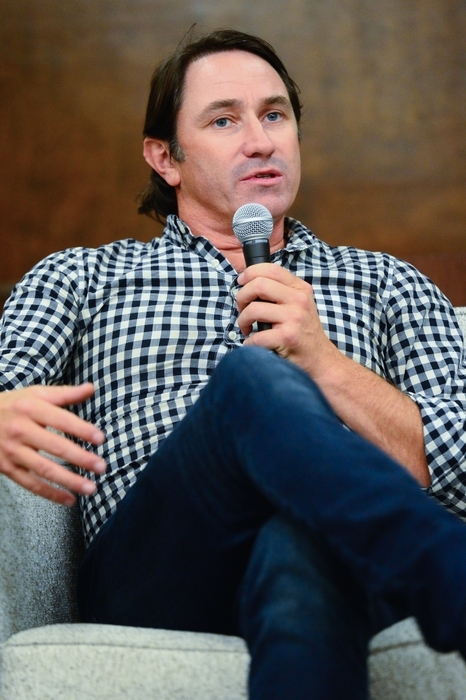
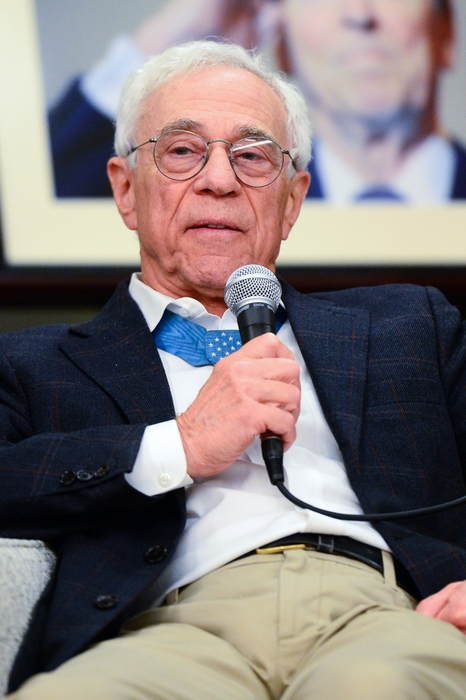
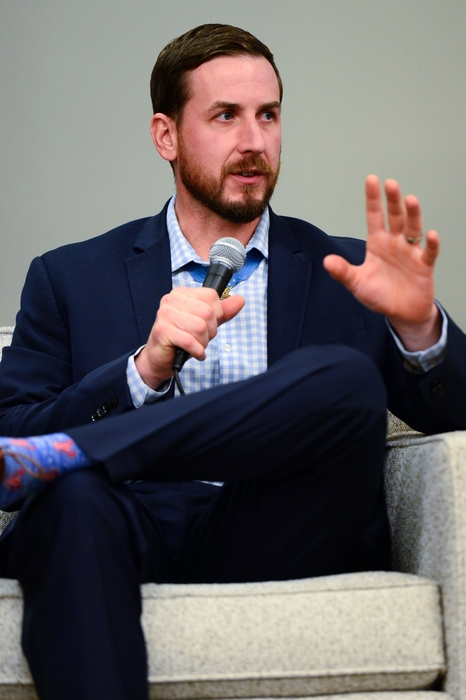

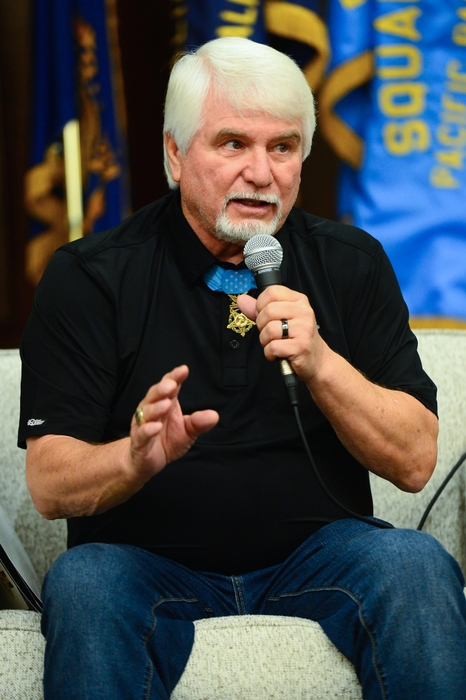
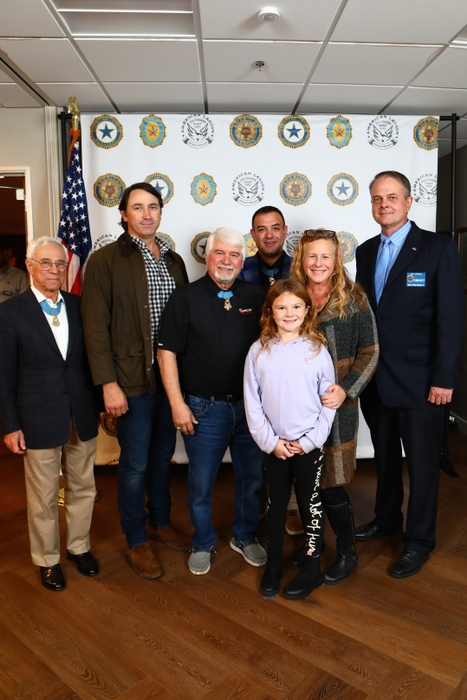
THANK YOU!!! For your service. I am thankful for our Military men and women,
past and present. What sacrifices they make. Whether it be on the home front or across the sea, ALL sacrifice something for the good of their country.
Thanks for the great writeup about these heroes!
Standing in awe of these guys . . .